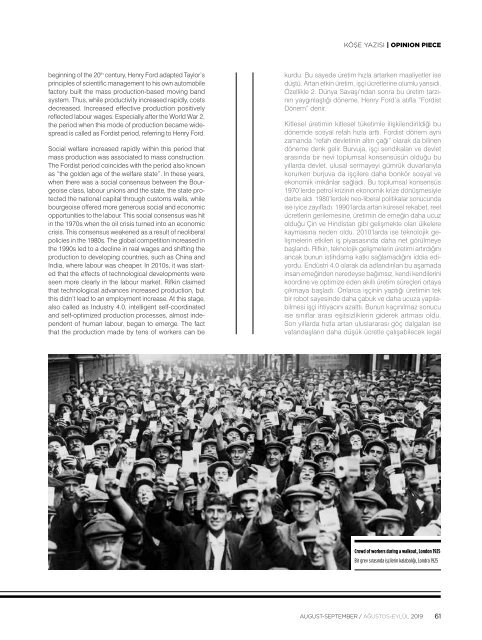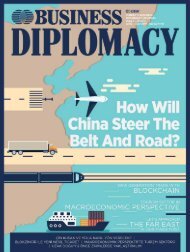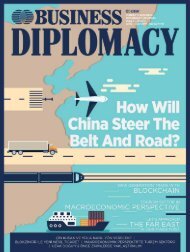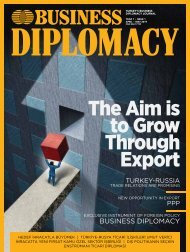BUSINESS DIPLOMACY ISSUE 3 / AUGUST - SEPTEMPER 2019
You also want an ePaper? Increase the reach of your titles
YUMPU automatically turns print PDFs into web optimized ePapers that Google loves.
KÖŞE YAZISI | OPINION PIECE<br />
beginning of the 20 th century, Henry Ford adapted Taylor’s<br />
principles of scientific management to his own automobile<br />
factory built the mass production-based moving band<br />
system. Thus, while productivity increased rapidly, costs<br />
decreased. Increased effective production positively<br />
reflected labour wages. Especially after the World War 2,<br />
the period when this mode of production became widespread<br />
is called as Fordist period, referring to Henry Ford.<br />
Social welfare increased rapidly within this period that<br />
mass production was associated to mass construction.<br />
The Fordist period coincides with the period also known<br />
as “the golden age of the welfare state”. In these years,<br />
when there was a social consensus between the Bourgeoise<br />
class, labour unions and the state, the state protected<br />
the national capital through customs walls, while<br />
bourgeoise offered more generous social and economic<br />
opportunities to the labour. This social consensus was hit<br />
in the 1970s when the oil crisis turned into an economic<br />
crisis. This consensus weakened as a result of neoliberal<br />
policies in the 1980s. The global competition increased in<br />
the 1990s led to a decline in real wages and shifting the<br />
production to developing countries, such as China and<br />
India, where labour was cheaper. In 2010s, it was started<br />
that the effects of technological developments were<br />
seen more clearly in the labour market. Rifkin claimed<br />
that technological advances increased production, but<br />
this didn’t lead to an employment increase. At this stage,<br />
also called as Industry 4.0, intelligent self-coordinated<br />
and self-optimized production processes, almost independent<br />
of human labour, began to emerge. The fact<br />
that the production made by tens of workers can be<br />
kurdu. Bu sayede üretim hızla artarken maaliyetler ise<br />
düştü. Artan etkin üretim, işçi ücretlerine olumlu yansıdı.<br />
Özellikle 2. Dünya Savaşı’ndan sonra bu üretim tarzının<br />
yaygınlaştığı döneme, Henry Ford’a atıfla “Fordist<br />
Dönem” denir.<br />
Kitlesel üretimin kitlesel tüketimle ilişkilendirildiği bu<br />
dönemde sosyal refah hızla arttı. Fordist dönem aynı<br />
zamanda “refah devletinin altın çağı” olarak da bilinen<br />
döneme denk gelir. Burvuja, işçi sendikaları ve devlet<br />
arasında bir nevi toplumsal konsensüsün olduğu bu<br />
yıllarda devlet, ulusal sermayeyi gümrük duvarlarıyla<br />
korurken burjuva da işçilere daha bonkör sosyal ve<br />
ekonomik imkânlar sağladı. Bu toplumsal konsensüs<br />
1970’lerde petrol krizinin ekonomik krize dönüşmesiyle<br />
darbe aldı. 1980’lerdeki neo-liberal politikalar sonucunda<br />
ise iyice zayıfladı. 1990’larda artan küresel rekabet, reel<br />
ücretlerin gerilemesine, üretimin de emeğin daha ucuz<br />
olduğu Çin ve Hindistan gibi gelişmekte olan ülkelere<br />
kaymasına neden oldu. 2010’larda ise teknolojik gelişmelerin<br />
etkileri iş piyasasında daha net görülmeye<br />
başlandı. Rifkin, teknolojik gelişmelerin üretimi artırdığını<br />
ancak bunun istihdama katkı sağlamadığını iddia ediyordu.<br />
Endüstri 4.0 olarak da adlandırılan bu aşamada<br />
insan emeğinden neredeyse bağımsız, kendi kendilerini<br />
koordine ve optimize eden akıllı üretim süreçleri ortaya<br />
çıkmaya başladı. Onlarca işçinin yaptığı üretimin tek<br />
bir robot sayesinde daha çabuk ve daha ucuza yapılabilmesi<br />
işçi ihtiyacını azalttı. Bunun kaçınılmaz sonucu<br />
ise sınıflar arası eşitsizliklerin giderek artması oldu.<br />
Son yıllarda hızla artan uluslararası göç dalgaları ise<br />
vatandaşların daha düşük ücretle çalışabilecek legal<br />
Crowd of workers during a walkout, London 1925<br />
Bir grev sırasında işçilerin kalabalığı, Londra 1925<br />
<strong>AUGUST</strong>-SEPTEMBER / AĞUSTOS-EYLÜL <strong>2019</strong><br />
61





